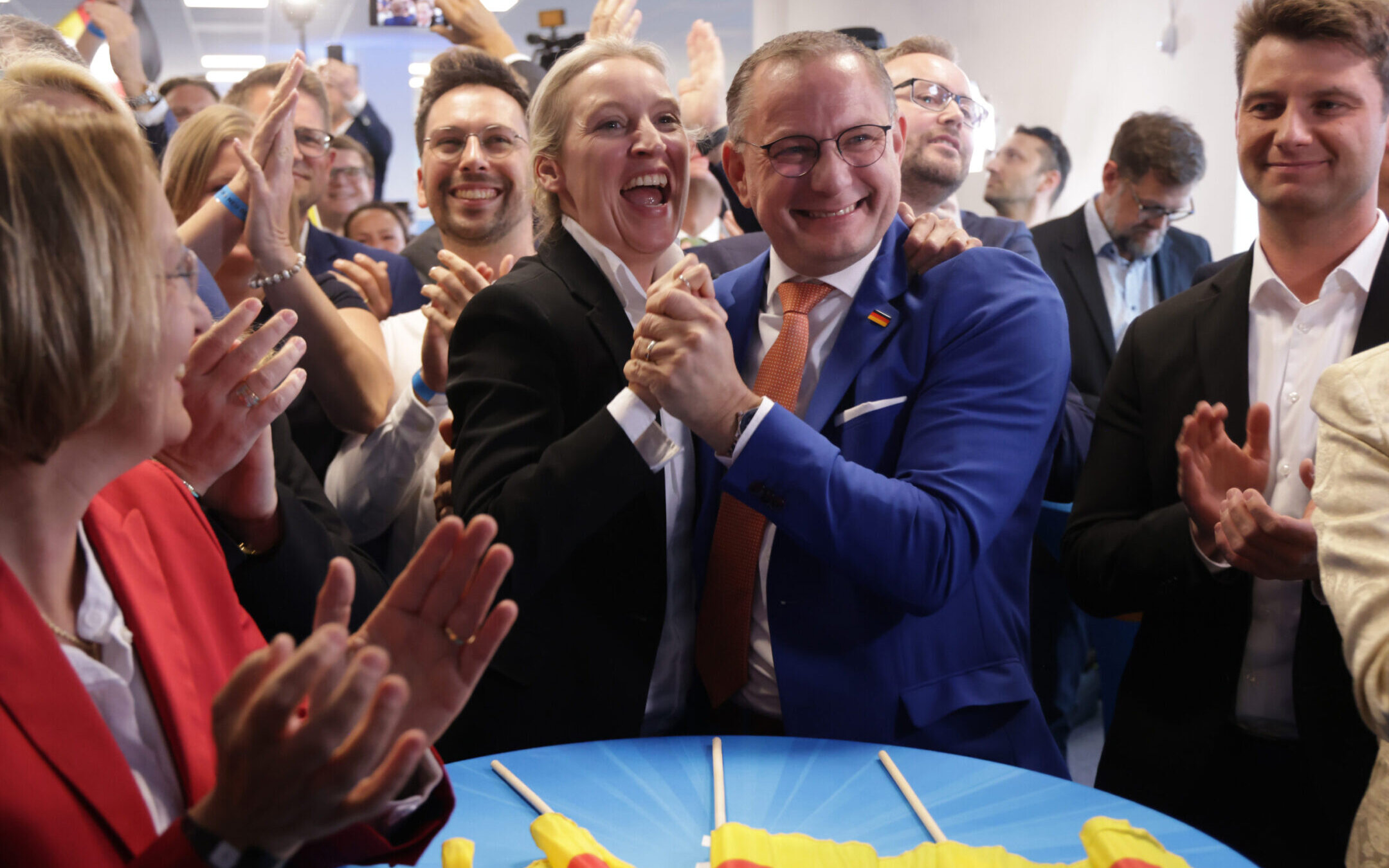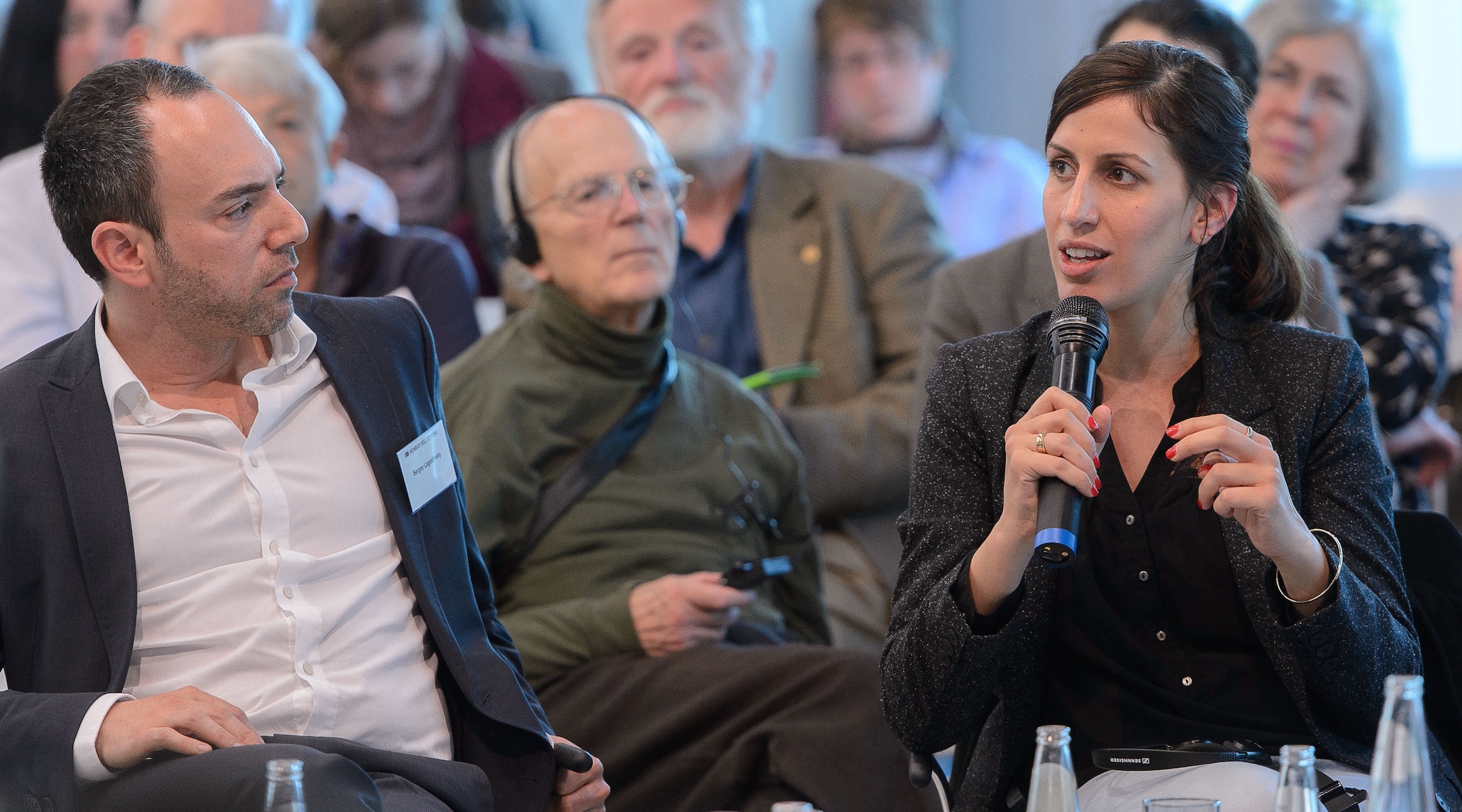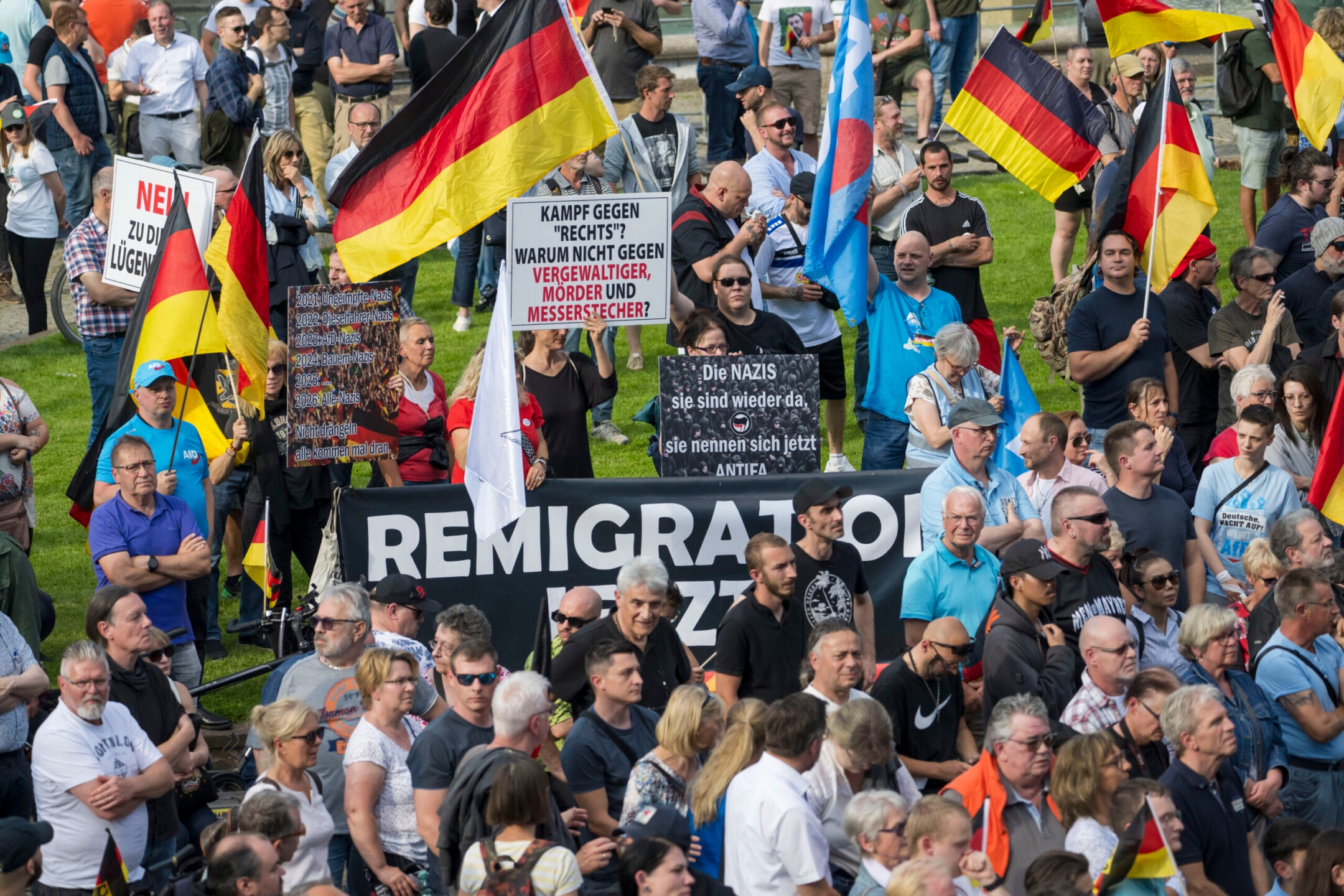Success of German far-right party in EU election has many Jews hearing echoes of Nazi past
The Alternative for Germany party, known as AfD, is virulently anti-immigrant and pro-Russian

Tino Chrupalla and Alice Weidel, co-leaders of the far-right Alternative for Germany political party, celebrate at the AfD election evening gathering following the release of initial election results in European parliamentary elections in Berlin, June 9. (Sean Gallup/Getty Images)
BERLIN — The success of German extremists in Sunday’s European Parliament election has mainstream Jewish leaders and politicians worried. Some say they fear the country is veering into political territory that resembles the era just before the rise of the Nazis here nearly a century ago.
The strong showing for far-right parties reflects worries about increasing numbers of Muslim refugees since 2015 in Germany. The Alternative for Germany Party stresses isolationism, takes an anti-EU and pro-Russian stance, and is accused of fomenting anti-Muslim sentiment. Some of its most extreme representatives have also belittled the Holocaust, saying that Germany has paid enough penance for the sins of an older generation.
Mainstream Jewish leaders raised the alarm about AfD soon after it was founded in 2013, and their concern has grown with each new success of the party on the local, national and international levels.
Now, “the fact that right-wing and left-wing populist parties received a fifth of the votes in the European Parliament elections in Germany should give all democratic forces pause,” Josef Schuster, head of the Central Council of Jews in Germany, said in a statement after the election on Monday.
“That is no longer a protest vote,” Schuster added. “I am very concerned that the AfD in particular, with its clear links to extreme right-wing ideas and its leading candidates’ connections to dictatorial regimes, was able to achieve such a result.”
The AfD gained several percentage points since the last election, giving it four more seats for a total of 15 in the legislative body that passes EU laws and is meant to safeguard democracy. The entire parliament is scheduled to grow from 705 to 720 members after this election.
Italy, France and Germany saw significant gains for far-right parties; such parties came in first in five out of the 27 member countries and second or third in five other countries. The main losers were Liberal and Green parties.
In Sunday’s election, the AfD came in second to Germany’s center-right Christian Democratic Union and its more conservative Bavarian sister party, the Christian Social Union.
The result came as no surprise to pundits who have watched the AfD edging out other mainstream parties in local elections across Germany in recent years, forcing its opponents to form convoluted coalitions in an attempt to smother the extremist voice.
“Many voters are obviously so dissatisfied with the current government policy that they are prepared to strengthen the political fringes — above all the AfD,” said Elio Adler, founder of the non-partisan, Berlin-based Jewish Values Initiative. “We therefore strongly advise the established parties not to base their policies on what the AfD does or says, but on what the citizens of the country want and/or are concerned about.”
That the far-right party has now done so well in Europe, Adler said, is “extremely alarming: for democracy and, as one of the most vulnerable groups, even more so for us Jews.”

Sergey Lagodinsky and Dana Golan attending a discussion in Berlin about Israel, April 30, 2015. (Heinrich-Böll-Stiftung/Frank Roehl)
Green Party politician Sergey Lagodinsky, who managed to keep his place in the EU parliament despite his party’s loss of 9 out of 12 seats, expressed similar worries.
“It’s quite alarming, generally, that we are having some dynamics that are pointing towards a Weimar mood,” said Lagodinsky, who is Jewish and came to Germany from Astrakhan with his family in 1993. Germany’s democratic Weimar Republic came to an end with the rise of the Nazi party in 1933, borne by a populist wave.
The AfD is “mimicking a pro-Jewish party because it fits their anti-Muslim agenda,” Lagodinsky said. “And this is something appealing for our community, which is really worried and insecure now and under attack, I would say.”
Mass protests against the AfD took place earlier this year following revelations that the party had held a secret meeting at a lakeside villa to discuss plans to deport foreigners, including those who had become German citizens. Prominent neo-Nazis attended the meeting, according to the news organization that broke the story, inducing painful echoes of the gathering of Nazi leaders at nearby Wannsee in 1942 to devise a plan to deport and then murder Jews.
While support for the AfD dipped in polls at the time, it soon rebounded and then accelerated. And the group’s supporters rallied themselves last weekend in advance of the elections, displaying signs that called for mass removal of immigrants.

Supporters of the far-right Alternative for Germany party gather in Mannheim for a campaign event, June 7, 2024. The AfD was not allowed to demonstrate in front of a memorial to a police officer murdered by an immigrant from Afghanistan, as it had sought to do. (Thomas Lohnes/Getty Images)
Some AfD supporters in the Jewish community told JTA that mainstream concerns are misplaced. The real problems are with antisemitism coming from Muslims in Germany, they say.
You don’t have to be a right-winger to vote for the AfD, said Marcel Goldhamer, a journalist and standup comedian in his late 20s who divides his time between Germany and the United States.
“I see myself totally in the middle of the road,” he said in a call from Boston. “I’m for border security and I am a patriot, and I think there is nothing wrong with it.”
Artur Abramovych, president of the AfD’s Jewish caucus, told JTA he was in a celebratory mood. But serious work has to be done, he added.
“As a Jew, of course, the thing I’m the most concerned about is the rise of antisemitism here,” Abramovych said in a phone interview. “It’s mainly due to the Muslim mass immigration. That’s absolutely clear. Everyone who tries to tell you something else is either a liar or paid by the German government,” he said. His implication was that the Central Council of Jews in Germany parrots the political stance of the federal government, which is its main funder.
Government statistics show that most antisemitic crimes whose perpetrators are identified are committed by someone with a far-right background.
But many crimes are never solved. And Abramovych, a 28-year-old writer whose family came to Germany from Ukraine in the 1990s, said he believed that some of that are have been mischaracterized.
“In 2017, in Munich, at the Oktoberfest, there was an Afghan refugee who stood on the table and showed the Hitler greeting,” which is illegal in Germany. “We had a grotesque case where a Syrian refugee painted swastikas on the walls of the refugee camp,” he added. He said he believed the police counted both incidents as right-wing extremist.
As a Zionist, he said he is also proud to note that the AfD “is the only party in Germany which is in favor of stopping funding UNRWA.” Some countries, including the United States, froze funding to the United Nations agency serving Palestinian refugees amid revelations that employees participated in Hamas’ Oct. 7 attack on Israel; Germany initially joined the freeze but signaled more recently that it would resume funding UNRWA.
The concerns of voters like Abramovych must not be left to the right-wing to solve, said Lagodinsky.
“We have to do something in the realm of security policies, homeland security. We have to address the Islamist issue. We have to,” he said. But he said that could be done “without ourselves copying the hateful way and hateful patterns” of the populist parties.
This article originally appeared on JTA.org.














